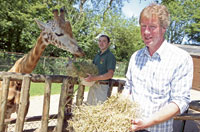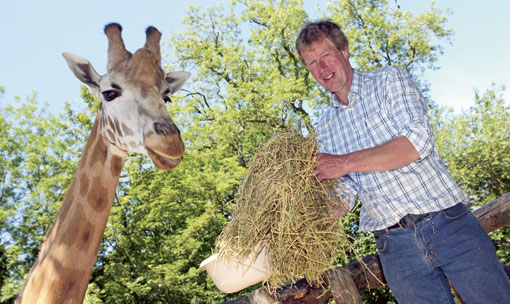VIDEO: Providing local feed for exotic breeds

Nine-year-old Kubwa is a towering Rothschild giraffe, originally from the Baringo District in East Africa and now a permanent resident at Dudley Zoological Gardens in the Midlands, where he lives with his two-year-old companion Keyah.
Some 4000 miles from his native habitat the keepers work hard to keep Kubwa in top condition, and that means a varied plant diet of hay, acacia, mimosa, and one of his favourites – lucerne.
Clover-like lucerne, also known as alfalfa, is a high-protein forage feed perfectly suited to a giraffe’s digestive system, but finding a reliable source in the UK has caused more than a few headaches for the zoo’s curators.
At one point they resorted to purchasing and importing it from as far afield as Canada. More recently they found a supplier in Hampshire. But still the journey was long and costly. The solution, it turned out, was less than less half an hour’s drive from the zoo’s front gates.
Video: Watch the giraffes at Dudley Zoo
Ian Sadler farms 428 acres in the South Staffs village of Kinver with son Luke. Half is grassland pasture, the rest is combinable crops, fruit and maize, and for the first time last year eight acres were marked out for a trial crop of lucerne.
Ian was prompted to get creative about searching out new customers and alternative revenue streams after the Milk Marketing Board disbanded, the local livestock market closed and the sugar beet factory closed, and for the first time marketing fell squarely on his shoulders.

His proactive approach of “write to everyone and sometimes you’re lucky,” paid off when Dudley Zoo asked if he would consider planting up especially for them. The zoo will take their first delivery of Staffordshire-grown lucerne this autumn, and it’s the start of what Jill Hitchman, Dudley Zoo’s head of media and communication, hopes will be a long-lasting partnership.
“We have to find funds for food, regardless of a poor season or low visitor figures, so we really do have to get the best possible value for money,” she says. “This is why having a farmer on our doorstep who is willing to plant up for us is fantastic.”
Dudley Zoo is no stranger to buying British – they’ve been doing it for the last 73 years.
Spider monkeys tuck into soft fruits and vegetables from Herefordshire, Shropshire and Worcestershire. Birds are fed on cereals from Staffordshire. The big cats eat meat from a Midlands wholesaler. Dust-free wood wool from Stourport makes the perfect bedding for apes, and wood shavings from Warwickshire can be found in enclosures throughout the site.
Ian on supplying to zoos • Quality is key – the standards zoos expect are incredibly high |
|---|
But it’s not just British, it’s best of British. The produce that finds its way into the animal enclosures is exactly the same as that found on supermarket shelves, and often better. Some produce reaches the zoo before it even makes it to market, and when there are shortcomings in supply, like two years ago when there was a late wheat crop, the zoo’s curator Matthew Lewis will approach local producers and buy it straight off the field.
The myth that animals will hoover up any old scraps is exactly that, says Jill – a myth. In reality Dudley Zoo’s residents are some of the fussiest eaters around.
“Our food has to be first-rate, because animals are used to picking fruit straight off the tree,” she explains. “Try offering a withered apple to an orang-utan – then duck as he gives it back!”
The freshest produce you can find on the site is fish, sourced from Grimsby and delivered to the zoo’s gates within two-and-a-half hours of being caught. Any older and the sea lions get upset stomachs.
This message that “quality is key” is something that Ian has taken to heart, and he offers up one piece of advice for anyone thinking about supplying to a similar customer: “The standards expected by Dudley Zoo are incredibly high, so focus on quality and don’t try to compete on price,” he suggests. “If the quality is there you’re looking at twice the value of hay – around £7 a bale delivered in.”
He also advises farmers to start small if they are thinking about growing to order, especially lucerne which he describes as a “fickle crop”. It’s only now, a year after first planting up, that he’s even thinking about expanding his initially cautious 8-acre crop.
Growing lucerne • Unlike hay which has to be bone dry, lucerne needs to retain a bit of damp |
|---|
The lucerne grown on Ian’s Staffordshire fields might end up in the mouths or under the paws of some of the world’s most exotic and endangered breeds – Rothschild giraffes, Asiatic lions and Sumatran tigers – but from the farmer’s perspective, it’s business as usual.
“Farming is fast becoming a service as much as a production industry, so the important thing is to get the relationship with the customer right,” says Ian, “and there is no such thing as an ordinary customer.”
When 1500 animals spanning 168 different species need to be fed, often several times a day, a crucial part of that customer relationship is a flexible and reliable delivery service. Curator Matthew Lewis, who is responsible for spending the zoo’s £1750 weekly food budget, has discovered that local farmers can almost always offer better delivery hours than the national hauliers, which is imperative when feeding time has to run like clockwork.
Such a close working relationship between farm and zoo could be an uneasy one, after all, one exists to breed, feed and slaughter; the other exists to protect its species from anything like a similar fate. But chief executive Peter Suddock is adamant that the similarities between running a zoo and a farm run deep.
“To start with, we are subject to the same EU regulations on public health, animal health and animal welfare that farms are subject to,” says Peter, who has been part of a DEFRA liaison group since the outbreak of foot-and-mouth.
“During foot and mouth we had to close our doors for three months, completely cutting off the revenue stream we rely on. We both work on a large acreage – our lion paddock is one acre alone. We’re both experts at feeding and moving large numbers of animals, and just like farmers our keepers are on-site around the clock, 365 days a year. The work never stops.”
Just last year, a group of 50 farmers from the Shropshire Chamber of Agriculture spent a day at the zoo to see what they could learn about the breeding and care of rare animals.
“Many of our members are cattle or sheep farmers, so they are interested in breeding programmes, gene pools, nutrition management, animal movement and record keeping,” says John Sumner, secretary of Shropshire Chamber of Agriculture. “There are lots of interesting similarities between farms and zoos, and this visit gave us a different slant on animal management and breeding.”
And there aren’t many farmers who won’t sympathise with the zoo’s battles with red tape – they can carry up to 400 risk assessments at any one time.
Dudley Zoo is so committed to getting closer to its local farmers it’s even dipping its toe into food industry events typically reserved for producers and retailers, starting with this year’s British Food Fortnight. It’s the first zoo to join the scheme in its eight-year history, and if their local success story with Ian is anything to go by, they won’t be the last.
About Ian Sadler
Ian’s 428-acre Kinver Edge Farm comprises grassland pasture, combinable crops, fruit and maize. He also has a small herd of pedigree shorthorns and a flock of lowland ewes. His shorthorns graze on public access land that is part of a heathland regeneration programme, and all his produce is available to buy in Kinver Edge Farmshop, run by Paul Share.
